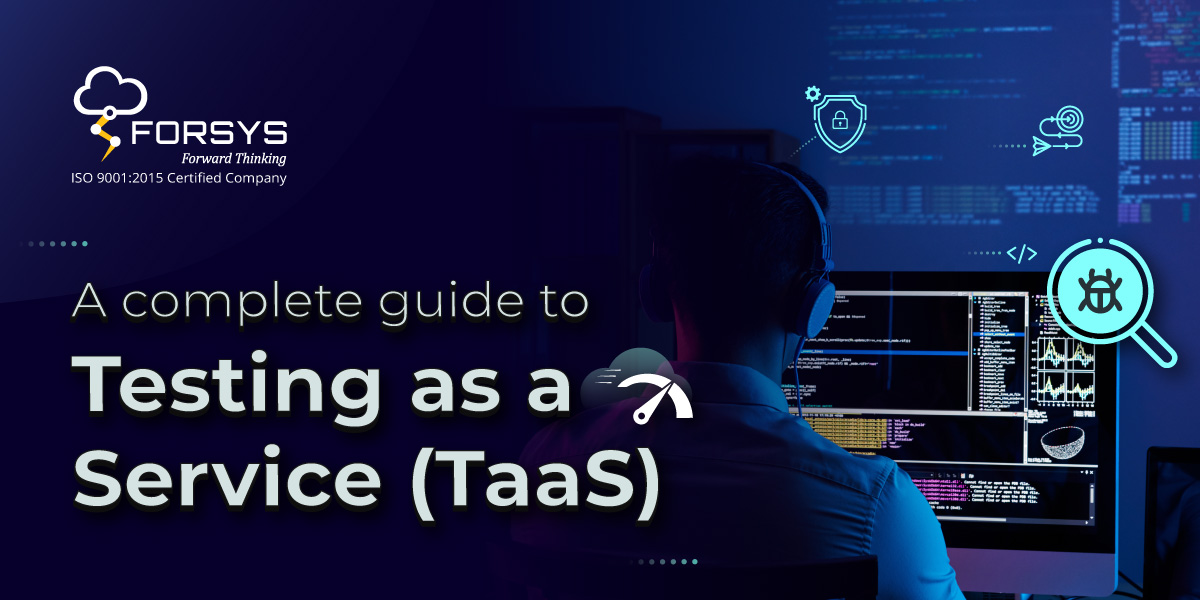Introduction
In today’s world where the pace of modern software enhancement is constantly on the rise, the pressure on businesses to validate software quality quickly is witnessing an upward trend. QA testing has emerged to become extremely necessary and inevitable in the Software Development Life Cycle (SDLC) with the rapidly expanding software industry and its growing demand for technologically advanced software that offers superior quality, functionality, and scalability.
While in the past testing was more of a fragmented single process, its progression to Managed Testing Model, which includes standardized test processes and infrastructure in an established Test Centre of Excellence, is worthy to take note of.
Want to understand why Testing as a Service (TaaS) has become a sought-after and viable testing model by organizations? Explore this post to understand what it is, the different types available, the benefits it offers, when enterprises should opt for it, and much more.
What is TaaS
In this type of outsourcing model, the software testing activities are managed by third-party service providers. This is favoured by enterprises where the testing needs can’t be managed internally and surpassed their capabilities. It has been observed that TaaS service providers engage certified resources and consultants well-versed in handling tests by simulating real-world environments to find software bugs.
Types of TaaS
Here are the different variants of TaaS that businesses should be aware of:
- Functional Testing: This validates the application against the functional and business requirements/specifications. The purpose of functional tests is to test each functionality of the application by providing appropriate input and verifying the output against the functional requirements.
- API Testing (REST and SOAP) – It refers to manual and automation testing where the APIs are tested to review their performance, functionality, reliability, and security. Here, in the automation QA testing type, REST Assured framework is used along with SoapUI and Postman.
- Performance Testing – In this type of testing, the JMeter tool is used to evaluate the stability, speed, and responsiveness of the software. A real-world environment is replicated by creating virtual users and different varied logical test cases are executed.
- Oracle ERP Fusion Cloud and Salesforce Testing: In this testing type, Selenium+JAVA is used along with the CI-CD (Jenkins) testing framework.
- Data Migration Testing – It refers to ETL testing where it is carried out to ensure that the data is extracted, transformed, and loaded in the correct format.
- Security Testing: This is executed to judge the safety of the application and identify the vulnerabilities to threats if any. The testing team will do a detailed scanning of the software to find the vulnerabilities and QA resolves them.
Apart from the ones listed above, some of the other types of TaaS include cloud testing, web services testing, business intelligence testing, agile/DevOps/DataOps testing, database testing, machine learning validation testing, etc.
Benefits of TaaS
Industry insiders believe that the TaaS market is one of the fastest-growing and will continue the robust growth momentum as innovation in testing lags at many organizations. According to Reportlinker.com, the global software testing services market will touch $34.49 billion during 2021-2025.
Here are some of the benefits that TaaS offers as compared to traditional testing:
- Higher flexibility in executing test cases as per evolving business and user’s needs.
- Achieve cost savings through cloud testing.
- Faster ROI as no investment is needed in hardware infrastructure, personnel, and software licensing.
- Secure test environments and data integrity are maintained with restricted access.
- Availability of pay per use model.
When does your business need TaaS?
Here are some scenarios when your organization should opt for TaaS:
- Your organization requires testing performed that you anticipate needs extensive resources
- Your application testing needs comprehensive automation within a short time quickly.
- You need to carry out ad-hoc or irregular testing activities that need a considerable number of resources.
Conclusion
There is no denying that TaaS offers several benefits. However, achieving the testing goals leveraging TaaS is only possible when you have the right partner by your side. Looking for a world-class TaaS provider? Forsys can help!
Our offering includes independent quality engineering, a wide range of software testing solutions, and quality assurance for businesses of all sizes across industry verticals. Our testing specialists are globally recognized for using world-class software testing methodologies and the Center of Excellence approach to deliver quality assurance and engineering. We cover the full range of functional and non-functional test requirements.
Connect now to understand our TaaS expertise in detail and learn in-depth why Fortune 500 companies rely on Forsys’ quality automation expertise to meet their varied testing needs.

